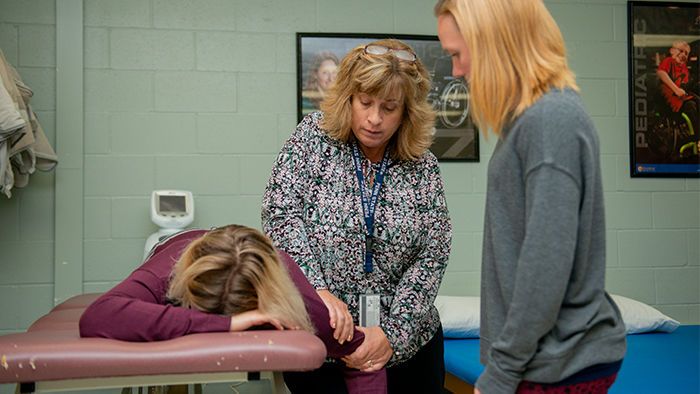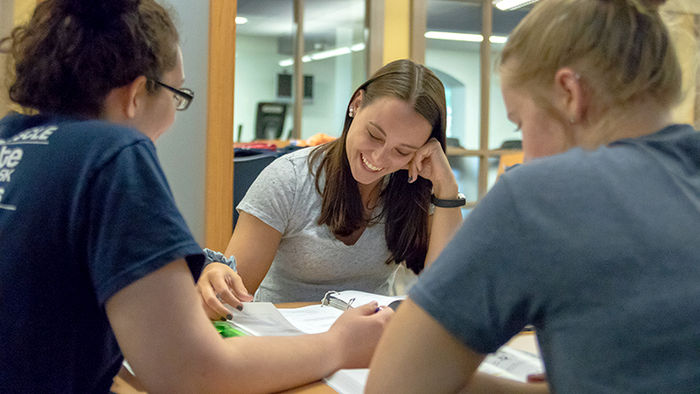Update: Penn State Shenango is not currently enrolling new students. Current students can access academic advising and degree planning through campus services.
As a physical therapist assistant, you’ll quickly discover your critical role in improving the lives of patients by strengthening their muscles, restoring mobility to stiff joints, or achieving renewed balance and coordination after a surgery.
Your client list may span ages and concerns, leading you to work with an athlete recovering from a sports-related injury, an infant who is struggling to reach developmental milestones, or a patient who is learning to walk again while healing from an illness all in one day.
Our program is accredited and prepares students to sit for the National Physical Therapy Examination for physical therapist assistants to earn licensure.
2-year Physical Therapist Assistant career opportunities
You will be responsible for patient care as a physical therapist assistant, performing a variety of tasks that include exercises, massages, electrical stimulation, paraffin baths, applying hot and cold packs, and assisting in traction and ultrasound treatment.
As a physical therapist assistant, you will blend your endless energy and passion for activity with your ability to be patient, resourceful, empathetic, and tactful to help patients and their families understand their treatments and adjust to rehabilitation.
This program prepares students to apply various treatment techniques under the direction and supervision of a physical therapist. You will implement interventions outlined in the physical therapist’s plan of care, collect data related to interventions, and modify selected interventions to progress patients towards their individual goals.
All states in the U.S. require physical therapist assistants to have graduated from a CAPTE-accredited program and obtain licensure in their state(s) of practice.
Career settings for a physical therapist assistant
- Outpatient clinics
- Hospitals
- Inpatient rehabilitation facilities
- Skilled nursing, extended care, or sub-acute facilities
- Home, education, or research centers
- Schools, hospices, industrial, workplace, or other occupational environments
- Fitness centers and sports training facilities
Continuing your education
Physical therapist assistants also commonly decide to continue their studies and earn a 4-year degree to progress employment opportunities, or pursue a doctoral degree to become a physical therapist.
What to expect in the 2-year Physical Therapist Assistant major
Penn State’s Associate of Science in Physical Therapist Assistant program prepares you with the knowledge and skills required to provide therapeutic exercise, functional training, soft tissue massage, electrotherapy, ultrasound, and other treatments included in the physical therapy plan of care.
As a physical therapist assistant student, you will take hands-on courses in specialized techniques that will help improve a patient’s mobility, relieve pain, and prevent or limit permanent physical disabilities.
You will participate in three real-world fieldwork clinical practicums that will help you develop a strong professional network in the community and gain valuable experience to pull upon once you enter the health care industry.
The size of each entering class is limited so that optimal clinical experiences and practical application situations can be maintained.
Students must progress through the program as prescribed by the suggested academic plan and their academic adviser.
Realistic physical therapy facilities and real clinical tools
Learn how to be a physical therapist assistant in a laboratory that replicates real-world facilities. You will have access to simulated clinic and hospital rooms to become familiar with a variety of settings and physical therapy tools, no matter where your career takes you.
Physical Therapist Assistants’ Club
Make connections in the physical therapy field as you prepare to become a physical therapist assistant professional. While each group of students select meaningful activities, you might lead your cohort to provide community service and education, host philanthropic efforts for meaningful causes, or work together to fundraise for a pre-licensure preparation course.
Program accreditation
The Physical Therapist Assistant Program at Penn State Shenango is accredited by the Commission on Accreditation in Physical Therapy Education (CAPTE), 3030 Potomac Ave., Suite 100, Alexandria, VA 22305-3085; telephone: 703-706-3245; email: [email protected]; website: http://www.capteonline.org. If needing to contact the program/institution directly, please call 724-983-2865 or email [email protected].
Middle States Commission on Higher Education
The Pennsylvania State University is authorized to grant associate degrees, and the accreditation status granted by Middle States Commission on Higher Education includes such degrees. As detailed in the Statement of Accreditation Status, the Middle States Commission on Higher Education recognizes the U.S. Secretary of Education’s approval of the Commission Accreditation in Physical Therapy Education to accredit physical therapist assistant programs.
CAPTE accreditation of a physical therapist assistant program satisfies state educational requirements in all states, the District of Columbia, Puerto Rico, and the U.S. Virgin Islands. Thus, students graduating from CAPTE-accredited physical therapist and physical therapist assistant education programs are eligible to take the National Physical Therapy Examination and apply for licensure in all states, the District of Columbia, Puerto Rico, and the U.S. Virgin Islands. For more information regarding state qualifications and licensure requirements, refer to the Federation of State Boards of Physical Therapy website.
Many US states and territories require professional licensure/certification to be employed. If you plan to pursue employment in a licensed profession after completing this program, please visit the Professional Licensure/Certification Disclosures by State interactive map.
Non-discrimination Policy
The University is committed to equal access to programs, facilities, admission, and employment for all persons. Discriminatory conduct and harassment violate the dignity of individuals and impedes the realization of the University’s educational mission. Read the policy on Penn State's website.






